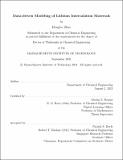Data-driven Modeling of Lithium Intercalation Materials
Author(s)
Zhao, Hongbo
DownloadThesis PDF (30.00Mb)
Advisor
Bazant, Martin Z.
Terms of use
Metadata
Show full item recordAbstract
For multi-scale electrochemical systems such as batteries, a number of tools including microscopy, diffraction, spectroscopy, and impedance exist to probe and measure from single active particles to the whole cell, but traditional modeling approaches fail to capture all the available information. With the arrival of high-throughput computation and experimentation, there is an unprecedented opportunity to solve key challenges in energy storage via data-driven methods.
In this thesis, I developed the framework of learning physics and extracting quantitative models of lithium intercalation materials from experimental data. Built upon the theoretical foundation of the reaction kinetics, transport phenomenon, thermodynamics, and electrochemistry of lithium intercalation materials, the theory describes the single-particle behavior and the population dynamics in a porous electrode. PDE-constrained optimization and Bayesian inference are used to infer and quantify the uncertainty of the constitutive laws from multiple data streams. Applications include learning the constitutive laws from images of pattern formation, inverting the unknown free energy, reaction kinetics, spatial heterogeneity, and chemo-mechanical coupling from images of lithium iron phosphate particles, and quantifying the autocatalytic reaction kinetics from X-ray diffraction of Li layered oxides. The results show the possibility to achieve full utilization of the datasets with quantitative agreement, enable model selection and validation, and advance the modeling of batteries.
Date issued
2021-09Department
Massachusetts Institute of Technology. Department of Chemical EngineeringPublisher
Massachusetts Institute of Technology